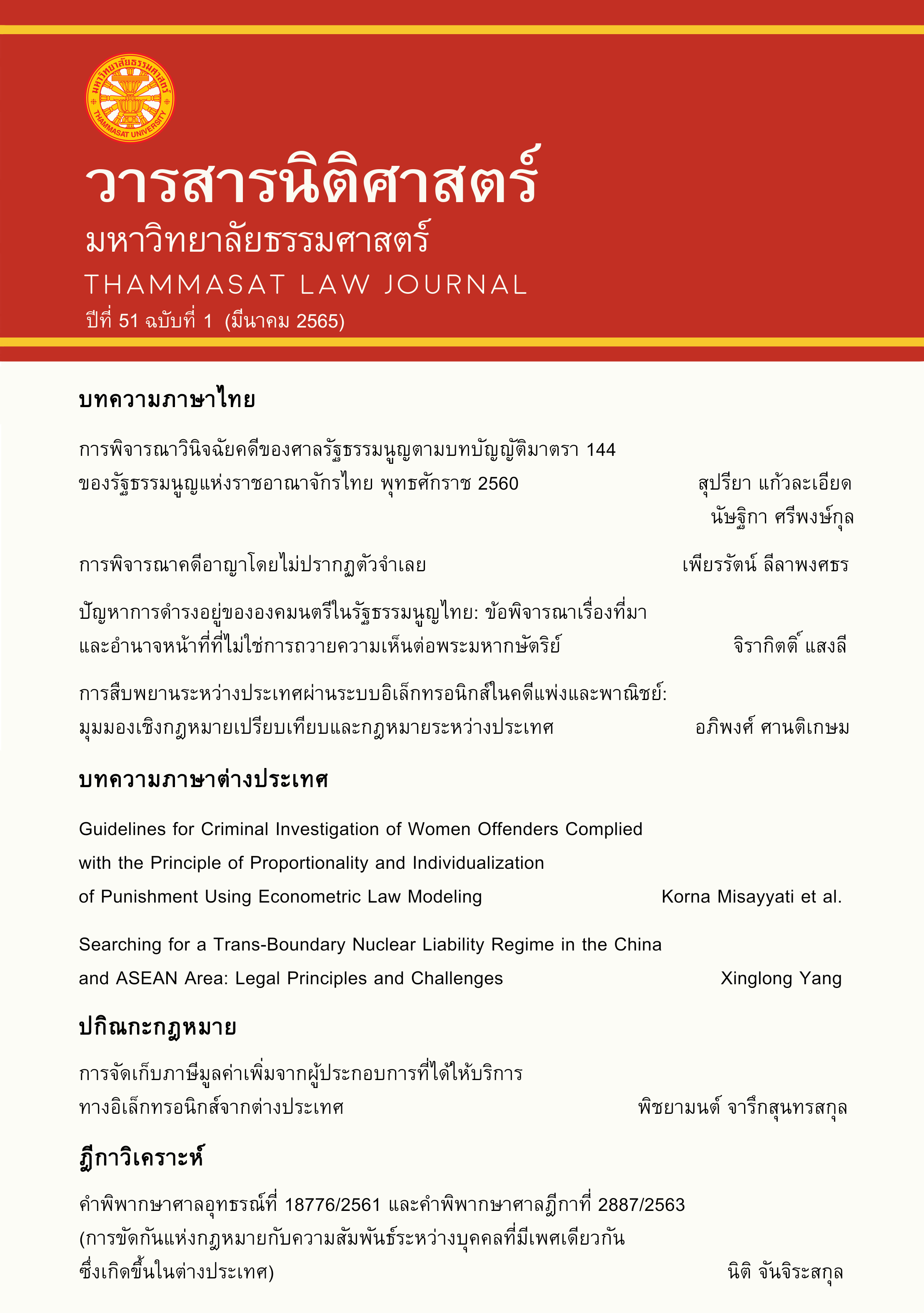การสืบพยานระหว่างประเทศผ่านระบบอิเล็กทรอนิกส์ในคดีแพ่งและพาณิชย์: มุมมองเชิงกฎหมายเปรียบเทียบและกฎหมายระหว่างประเทศ
คำสำคัญ:
การสืบพยานระหว่างประเทศ การสืบพยานผ่านระบบอิเล็กทรอนิกส์ กฎหมายระหว่างประเทศ กฎหมายเปรียบเทียบบทคัดย่อ
เทคโนโลยีสารสนเทศสมัยใหม่ได้ช่วยพัฒนาระบบการบริหารจัดการคดีของศาลให้มีประสิทธิภาพและมีความรวดเร็วมากยิ่งขึ้น และด้วยปัจจุบันสถานการณ์การแพร่ระบาดของโรคติดเชื้อไวรัสโคโรนา 2019 ซึ่งลุกลามไปทั่วโลกยังเป็นส่วนเร่งให้มีการนำเทคโนโลยีต่าง ๆ มาใช้ภายในศาลมากขึ้น การนำระบบอิเล็กทรอนิกส์มาใช้ในการสืบพยานระหว่างประเทศในคดีแพ่งและพาณิชย์สามารถช่วยให้ศาลพิจารณาพิพากษาอรรถคดีได้โดยสะดวกรวดเร็ว ทั้งยังช่วยลดค่าใช้จ่ายและระยะเวลาของคู่ความ โดยเฉพาะอย่างยิ่งในกรณีที่พยานมีถิ่นที่อยู่ในต่างประเทศ อย่างไรก็ดี การสืบพยานระหว่างประเทศผ่านระบบอิเล็กทรอนิกส์ แม้จะสามารถกระทำได้ตามประมวลกฎหมายวิธีพิจารณาความแพ่งและข้อกำหนดของประธานศาลฎีกาที่เกี่ยวข้อง แต่ก็ยังอาจมีประเด็นปัญหาทางกฎหมายระหว่างประเทศได้เช่นเดียวกัน เนื่องจากมีการกระทำส่วนหนึ่งเกิดขึ้นในดินแดนของต่างประเทศ ซึ่งอาจมองได้ว่าเป็นการใช้อำนาจอธิปไตยเหนือดินแดนของต่างประเทศ หรือขัดต่อกฎหมายภายในของประเทศที่เป็นถิ่นที่อยู่ของพยาน เช่น บางประเทศมีกฎหมายห้ามมิให้ศาลต่างประเทศทำการสืบพยานผ่านระบบอิเล็กทรอนิกส์โดยไม่ได้รับอนุญาตก่อน อันอาจส่งผลกระทบต่อความสัมพันธ์ทางการทูต หรือการยอมรับและบังคับตามคำพิพากษาของศาลไทยในต่างประเทศ นอกจากนี้ ยังมีประเด็นปัญหาในเชิงความเหมาะสมและหลักศุภนิติกระบวน (Due Process) ว่า การสืบพยานผ่านระบบอิเล็กทรอนิกส์อาจกระทบต่อคุณภาพของการสืบพยานและการชั่งน้ำหนักพยานหลักฐานของศาล จึงอาจไม่สามารถใช้ทดแทนการสืบพยานในห้องพิจารณาได้ในทุกลักษณะคดี
บทความนี้จึงนำเสนอหลักเกณฑ์ทางกฎหมายสำหรับศาลไทยในการพิจารณาเหตุปัจจัยและเงื่อนไขในการสืบพยานระหว่างประเทศผ่านระบบอิเล็กทรอนิกส์ โดยลำดับแรก นอกจากเงื่อนไขตามประมวลกฎหมายวิธีพิจารณาความแพ่งแล้ว ศาลไทยควรตรวจสอบความชอบด้วยกฎหมายระหว่างประเทศและกฎหมายภายในของประเทศที่เป็นถิ่นที่อยู่ของพยานด้วยว่า อนุญาตให้ศาลไทยทำการสืบพยานผ่านระบบอิเล็กทรอนิกส์ได้หรือไม่ นอกจากนี้ ในการพิจารณาว่า สมควรที่จะจัดให้มีการสืบพยานผ่านระบบอิเล็กทรอนิกส์หรือไม่นั้น ศาลไทยควรคำนึงถึงความสะดวกรวดเร็วในการพิจารณา ค่าใช้จ่าย ความยากลำบากของพยานในการเดินทาง ลักษณะและความสำคัญของพยานนั้น ๆ ประกอบด้วย รวมทั้งต้องจัดให้มีมาตรการที่เหมาะสมซึ่งทำให้ศาลสามารถสืบพยานได้อย่างมีประสิทธิภาพและคู่ความได้รับความยุติธรรมใกล้เคียงกับการสืบพยานในรูปแบบปกติมากที่สุด
เอกสารอ้างอิง
• ชุมพร ปัจจุสานนท์, 'ข้อคิดบางประการเกี่ยวกับการขัดกันแห่งเขตอำนาจศาลของประเทศไทยในทัศนะของกฎหมายระหว่างประเทศแผนกคดีบุคคล' (2540) 1 วารสารกฎหมาย.
• ธรรมนูญ สงวนเขียว, ‘ข้อพิจารณาเกี่ยวกับการสืบพยานหลักฐานและพยานบุคคลในลักษณะการประชุมทางจอภาพระหว่างประเทศ เพื่อรองรับการพัฒนาระบบงานของศาลยุติธรรมสู่ D-Court’ (2562) 1 ดุลพาห.
• ‘สนธิสัญญาและความตกลงทางแพ่ง’ (สำนักกฎหมายและวิชาการศาลยุติธรรม) <https://jla.coj.go.th/th/content/category/articles/id/ 8/cid/1612> สืบค้นเมื่อ 1 สิงหาคม 2564.
• หนังสือสำนักงานศาลยุติธรรม ที่ ศย 016/64805 ลงวันที่ 19 พฤศจิกายน 2558 เรื่อง ตอบข้อหารือเกี่ยวกับหลักเกณฑ์ และรายละเอียดการดำเนินการ รวมทั้งข้อตกลงระหว่างกันหรือธรรมเนียมปฏิบัติระหว่างประเทศในการสืบพยานโดยระบบการประชุมทางจอภาพ.
• Hague Conference of Private International Law, Guide to Good Practice on the Use of Video-Link under the Evidence Convention <https://assets.hcch.net/docs/569cfb46-9bb2-45e0-b240-ec02645ac20d.pdf> accessed 1 August 2021.
• Keisuke Takeshita, ‘A Contemporary Analysis of the Taking of the Evidence Abroad: Use of VIdeo-Link Technology and Jurisdictional Issues’ (May 2019) 118 Kokusai Gaiko Zassi [Journal of International Law and Diplomacy].
• David McClean, International Co-Operation in Civil and Criminal Matters, (3rd edn, Oxford University Press, 2012).
• Federal Department of Justice and Police, International Judicial Assistance in Civil Matters - Guideline 3rd Edition (Latest Update January 2013) accessed 1 August 2021.
• Hague Conference on Private International Law, Synopsis of Response to the Country Profile Questionnaire on the Taking of the Evidence by Video-Link under the Hague Convention of 18 March 1970 on the Taking of Evidence Abroad in Civil and Commercial Matters (Evidence Convention) <https://assets.hcch.net/docs/1dfce8db-44c1-459e-b6b2-025954328dc0.pdf> accessed 1 August 2021.
• General Secretariat of the Supreme Court of Japan, Kokusai Minji Tetsuzuki Handbook [Handbook for International Civil Litigation] (Tokyo: Hosokai, 2013).
• ‘Methods for a Court of a Foreign State to Request Japan to Serve Judicial or Extrajudicial Documents and Take Evidence' (Consular Services, Ministry of Foreign Affairs of Japan, 28 December 2018) <https://www.mofa.go.jp/ca/cp/ page25e_000251.html> accessed 1 August 2021.
• Jingru Wang, 'Can China’s New ‘Blocking Statute’ Combat Foreign Sanctions?' (Conflictoflaws.net, 30 January 2021) <https://conflictoflaws.net/2021/can-chinas-new-blocking-statute-combat-foreign-sanctions/> accessed 1 August 2021.
• Gary Born and Peter B. Rutledge, International Civil Litigation in United States Courts, Sixth edition, Aspen Casebook Series (New York: Wolters Kluwer, 2018).
• Attorney-General’s Department, Taking of Evidence in Australia for Foreign Court Proceedings <https://www.ag.gov.au/sites/default/files/2020-03/Taking-of-Evidence-in-Australia-for-Foreign-Court-Proceedings.pdf> accessed 1 August 2021.
• Alex Mills, ‘Rethinking Jurisdiction in International Law’ (September 2014) 84 British Yearbook of International Law.
• Roger O’Keefe, ‘Universal Jurisdiction: Clarifying the Basic Concept’ (2014) 2 Journal of International Criminal Justice.
• Mireille Hildebrandt, ‘Extraterritorial Jurisdiction to Enforce in Cyberspace? Bodin, Schmitt, Grotius in Cyberspace’ (2013) 63, 2 University of Toronto Law Journal.
• ‘Status Table’ (Convention of 18 March 1970 on the Taking of Evidence Abroad in Civil or Commercial Matters, Hague Conference on Private International Law) <https://www.hcch.net/en/instruments/conventions/status-table/?cid=82> accessed 1 August 2021.
• Meghan Dunn and Rebecca Norwick, Report of a Survey of Videoconferencing in the Courts of Appeals (Federal Judicial Center, 2016) <https://www.fjc.gov/sites/default/files/2012/VidConCA.pdf> accessed 1 August 2021.
• European Union, Final Report Informal Working Group on Cross-Border Videoconferencing 2014, accessed 1 August 2021.
• Council of Europe, Electronic Evidence in Civil and Administrative Proceedings – Guidelines and Explanatory Memorandum 2019 <https://rm.coe.int/guidelines-on-electronic-evidence-and-explanatory-memorandum/1680968ab5> accessed 1 August 2021.
ดาวน์โหลด
เผยแพร่แล้ว
ฉบับ
ประเภทบทความ
สัญญาอนุญาต
ลิขสิทธิ์ (c) 2022 วารสารนิติศาสตร์ มหาวิทยาลัยธรรมศาสตร์

อนุญาตภายใต้เงื่อนไข Creative Commons Attribution-NonCommercial-NoDerivatives 4.0 International License.
ผลงานที่ตีพิมพ์ในวารสารนิติศาสตร์เป็นลิขสิทธิ์ของวารสารนิติศาสตร์ มหาวิทยาลัยธรรมศาสตร์ และวารสารนิติศาสตร์ มหาวิทยาลัยธรรมศาสตร์ สงวนสิทธิในการเผยแพร่ผลงานที่ตีพิมพ์ในแบบรูปเล่มและทางสื่ออิเล็กทรอนิกส์อื่นใด
บทความหรือข้อความคิดเห็นใด ๆ ที่ปรากฏในวารสารนิติศาสตร์เป็นความรับผิดชอบของผู้เขียนโดยเฉพาะ คณะนิติศาสตร์ มหาวิทยาลัยธรรมศาสตร์ และบรรณาธิการไม่จําเป็นต้องเห็นด้วยหรือร่วมรับผิดชอบใด ๆ



